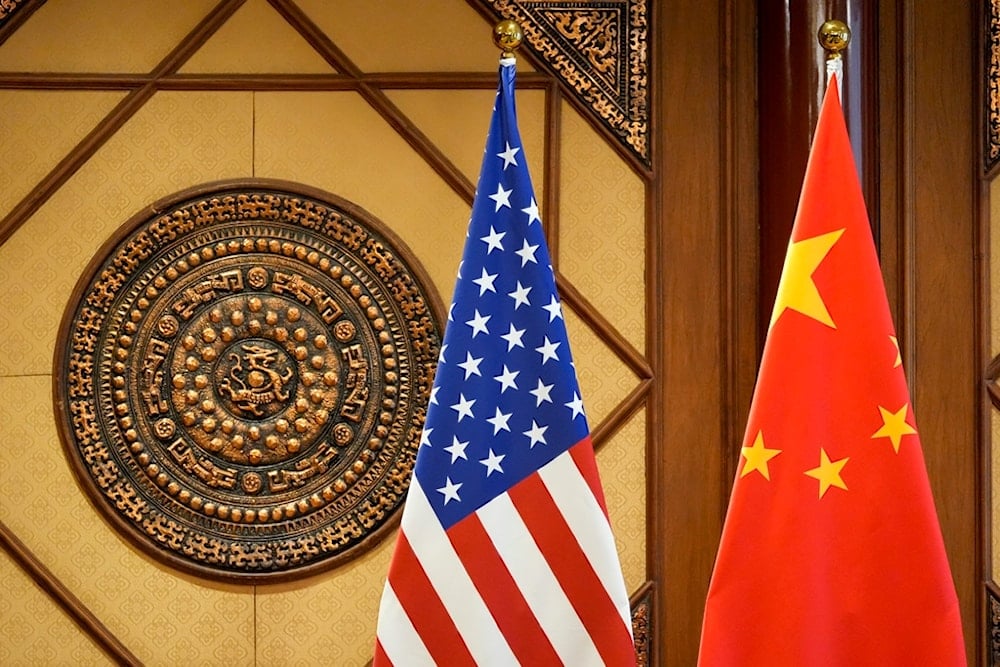US sanctions 140 Chinese firms in latest chip technology crackdown
Among the newly sanctioned companies are Naura Technology Group, AMC Research, Skyverse Technology, Empyrean Technology, and Nanda Optoelectronic Semiconductor Materials.
-

Flags of the U.S and China sit in a room where U.S. Secretary of State Antony Blinken meets with China's Minister of Public Security Wang Xiaohong at the Diaoyutai State Guesthouse, Friday, April 26, 2024, in Beijing, China. (AP)
The South China Morning Post reported on Thursday that the United States has escalated its efforts to curb China's semiconductor development by imposing new sanctions targeting 140 Chinese chip-related organizations.
This marks the third wave of restrictions in as many years, intensifying Washington's campaign to hamper Beijing's ambitions in advanced technologies, particularly in semiconductors and artificial intelligence (AI).
Chip Crackdown
The latest measures, introduced by the US Commerce Department, expand the trade blacklist, or "Entity List," to include key players in China's semiconductor supply chain.
Among the newly sanctioned companies are Naura Technology Group, AMC Research, Skyverse Technology, Empyrean Technology, and Nanda Optoelectronic Semiconductor Materials.
These firms provide critical support to China's state-driven efforts to localize its chip technology. The sanctions restrict these companies' ability to import US technologies and collaborate with entities using American-origin tools and software.
Read more: US chip measures against China not 'technology blockade': Sullivan
Industry analysts note that these restrictions are a significant escalation compared to previous sanctions, as they target foundational suppliers rather than just high-profile chipmakers.
The new controls also include tighter regulations on 24 types of semiconductor manufacturing equipment essential for producing advanced chips.
This move is expected to impact China's ability to procure tools for etching, wafer cleaning, ion implantation, inspection, and metrology—areas where the country remains heavily reliant on foreign imports.
Chip Battle
Adding to the restrictions, the US has imposed export controls on high-bandwidth memory chips, vital components in AI applications, potentially disrupting supply chains involving South Korean giants Samsung Electronics and SK Hynix.
However, the sanctions include exemptions for the Netherlands and Japan, allowing Chinese firms to purchase certain equipment from these nations despite their use of US technology.
Chinese companies have downplayed the immediate impact of the sanctions, citing years of preparation for such scenarios. Naura Technology, one of the affected firms, stated that its operations remain normal despite 10 of its subsidiaries being added to the blacklist.
Analysts at Citic Securities, a state-backed investment bank, echoed this sentiment, noting that the measures could accelerate the localization of China's semiconductor supply chain.
Read more: EU secures €115Bln in chip investments following Chips Act launch
Tech Tensions
The sanctions are part of a broader US strategy to limit China's access to cutting-edge technologies that could enhance its military and economic capabilities.
Over the past two years, the US has implemented multiple export control measures targeting advanced chipmaking tools, materials, and software.
The latest move also includes sanctions against two Chinese venture capital firms, Wise Road Capital and Wingtech Technology, accused of aiding the Chinese government in acquiring overseas semiconductor assets.
Experts suggest that while China has made significant progress in localizing its chip industry, the latest sanctions could slow its advancements in producing cutting-edge semiconductors and AI technologies.
However, with Beijing doubling down on self-reliance initiatives, the geopolitical battle over technology is far from over.

 3 Min Read
3 Min Read








